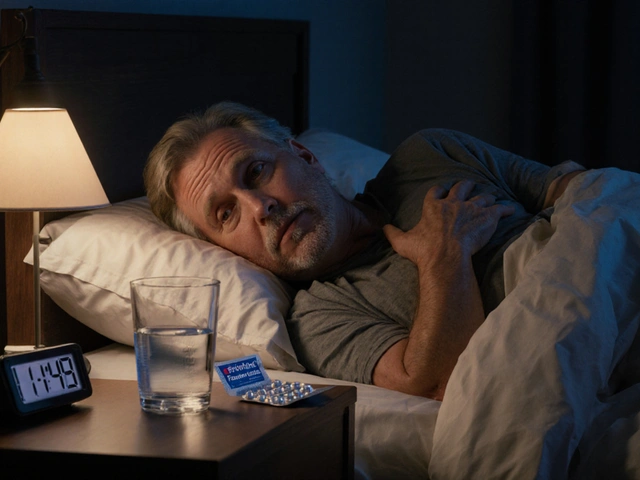Picture this: it’s 2 a.m., you’re staring at the ceiling, heart pounding, and every tiny noise feels like a drum solo. You just want your brain to chill for once. That’s where Ativan steps in for millions, but have you ever wondered what’s actually happening inside your body when you swallow that tiny pill?
How Ativan Works: Inside the Brain’s Chill Button
Ativan is the brand name for lorazepam—a medication from the benzodiazepine family. If you imagine your brain’s anxiety as a wild party, Ativan is like a bouncer who calms down the crowd. It works by boosting the effects of GABA, a neurotransmitter that tells your nervous system to slow things down. Not a bad gig, right?
Doctors commonly prescribe Ativan for anxiety disorders, panic attacks, insomnia, and, in hospitals, to calm people before surgery or help with alcohol withdrawal. It acts pretty fast, usually within 20 to 30 minutes, making it a go-to for sudden anxiety spikes. That’s also why some folks use it to help with fear of flying or dental procedures.
In the science world, Ativan is considered a ‘short-acting’ benzo. This means it gets to work fast but doesn’t stick around too long in your system. But that doesn’t mean there’s zero risk. In fact, quick-on, quick-off drugs sometimes tempt people to take higher doses or reach for a second pill sooner than they should.
If you’re wondering if it really works, data doesn’t lie: a large 2023 study found about 85% of people reported relief from severe anxiety after a single 1mg dose. But you don’t get this chill without some catch.
Common Uses and Dosage: Not Just for Anxiety
Anxiety is the headliner, but Ativan’s resume goes further. Doctors might hand out Ativan for short-term insomnia, especially when stress is keeping someone up at night. It’s also common in seizure emergencies, and for chemo patients whose nausea needs serious backup.
For adults, starting doses usually range from 0.5 to 2mg, taken one to three times a day, depending on the need. If it’s for sleep, it’s often just one dose before bed. Elderly folks tend to start lower, since their bodies process meds more slowly and they’re more prone to grogginess and falls.
People sometimes ask: "Can I take it for weeks if my anxiety is awful?" Here’s the snag. Ativan is meant for the short term—think days or weeks, not months. The risk of dependence and withdrawal can ramp up fast compared to some other anxiety meds. For ongoing issues, doctors often switch people to antidepressants or therapy instead, to dodge the dependence trap.
Always, always follow dosing directions to the letter. Popping more than prescribed or mixing with alcohol can drag down your breathing, mess with your memory, or even put your life in danger. If that sounds intense, it’s because it is. Mixing Ativan and other sedatives (like painkillers or other benzos) is the main reason people end up in emergency rooms with overdoses.
| Condition | Usual Dose | Duration |
|---|---|---|
| Anxiety | 0.5-2mg, 2-3 times daily | Short-term, up to 4 weeks |
| Insomnia | 1-2mg at bedtime | Days to weeks |
| Seizure emergencies | Usually given IV by medical staff | One-time use |
| Pre-procedure calming | 2mg-4mg before event | Single dose |
| Chemotherapy nausea | 0.5-2mg before treatment | Occasional use |

Risks, Side Effects, and Reality Checks
There’s no sugarcoating it: Ativan can be a lifesaver in the right circumstances, but ignoring the risks is like driving with your eyes closed. The most common side effects? Drowsiness, dizziness, and trouble concentrating. Take Ativan and try to multitask, and you might find yourself losing your keys, forgetting phone calls, or spacing out in conversations. Operating heavy machinery (including your car) after dosing is a hard no until you know how it affects you.
Physical dependence sneaks up quicker than people realize. Use Ativan daily for a couple of weeks, and your brain can start to rely on it for calm. Quit suddenly, and you might get slammed with withdrawal—think sleep problems, wild mood swings, anxiety worse than before, and in severe cases, even seizures.
Here’s something a lot of people miss: Ativan can linger longer in older adults or people with liver trouble. That’s why doctors usually start with lower doses. Other real-life hazards include falls (especially in seniors), confusion, and coordination problems. Some people, particularly those with a family or personal substance use history, are more likely to get hooked. There’s no shame in asking for help or switching meds if you notice cravings or trouble stopping.
- Avoid mixing Ativan with alcohol, opioids, or other sleeping pills. The combo can slow your breathing or stop it altogether.
- Don’t use Ativan for long-term stress management. It’s not designed for months or years of use.
- If you’ve been taking it daily for more than a month, never stop cold turkey. Call your prescriber for a slow, safe taper plan.
- If you’re pregnant or breastfeeding, Ativan is usually a no-go—it can affect the baby. Always talk to your doctor.
- Keep Ativan out of reach from kids or curious teens. Benzos are among the most misused prescription drugs by young people.
Interesting fact: According to CDC surveillance from 2022, around 14% of emergency room overdoses related to benzodiazepines involved Ativan specifically, and half of those also included alcohol or opioids. Safety really isn’t negotiable with this stuff.
Long-Term Effects and Dependency: What You Need to Know
This next part’s important, especially for anyone tempted to lean on Ativan as a daily crutch. Long-term use does more than just calm anxiety—it literally changes how your brain manages stress and relaxation. After a while, your body starts producing less of its own natural calming chemicals, making it really hard to feel okay without the pills. That’s why dependency and withdrawal hit so many people by surprise.
There’s also something called "tolerance," which means you need higher doses to get the same calming effect. Tolerance can show up in just a couple of weeks of regular use. And if you push the dose up, side effects follow closely—grogginess, memory lapses, and sluggish thinking aren’t exactly fun trade-offs.
Withdrawal is no joke. If your body’s gotten used to Ativan and you stop suddenly, you might deal with shaking, muscle pain, trouble sleeping, or even hallucinations. Not exactly the way anyone wants to start their day. Hospitals see thousands of cases each year where people need supervised detox just to come off long-term Ativan.
If you’re worried about getting stuck on Ativan, here are some tips:
- Talk openly with your prescriber if you notice your anxiety coming back before your next dose or if you feel odd cravings. They’ve seen it before.
- If you’ve been on it for a while, discuss tapering down slowly instead of quitting abruptly. People who reduce their dose little by little have way fewer withdrawal problems.
- Don’t be embarrassed to ask about alternative treatments—therapy, non-addictive meds, even lifestyle stuff like yoga or sleep routines make a difference in the long run.
| Sign | Frequency |
|---|---|
| Needing more to feel calm | Common after 2-4 weeks daily |
| Craving doses | Occasional but serious |
| Withdrawal symptoms when skipping doses | Frequent after weeks of use |
| Trouble stopping even with side effects | Less common, should be addressed |
The risks might seem overwhelming, but they don’t need to be if you stay in regular contact with someone who knows their stuff. Most dependency issues happen when people try to tough it out alone or don’t realize how fast things can spiral.

Real-World Tips: Getting the Most (and Least Trouble) from Ativan
If you and your doc decide Ativan is right for you, a few street-smart tricks go a long way. First, keep your prescription locked up—not just out of reach, but locked. Friends or family who know about your prescription might ask for “just one” during a rough patch. Hard pass. Never share your prescription.
Timing matters: take Ativan only when you really need it. Some people save it for flights, stressful work events, or when they can’t sleep for days. Others, with a psychiatrist’s guidance, might have a set plan: say, 0.5mg right before a nerve-wracking event. There’s nothing wrong with using it responsibly, but having a solid routine (and knowing your triggers) helps avoid accidental overuse.
Set an alarm or checklist if you struggle to remember if you took a dose. Double-dosing is one of the most common mistakes leading to grogginess or falls. If your schedule is especially hectic (traveling a lot, changing shifts at work), keep track in a journal or phone app.
If you forget a dose and you're supposed to take it regularly, don’t double up to “catch up.” Just take the next dose as scheduled. If you experience weird side effects—like trouble breathing, rash, or fainting—call for help ASAP.
Always let other health professionals know if you’re taking Ativan. Dentists, ER docs, even allergy doctors. This can prevent ugly drug interactions or misunderstandings if you land at the hospital unexpectedly.
Some people report that eating a light snack before taking Ativan helps avoid dizziness or stomach upset, while others find it works better on an empty stomach. You’ll know best what your body prefers after a few tries, but don’t mix it with grapefruit juice—it slows down how your liver breaks down Ativan and can lead to stronger side effects.
And here’s a tip from nurses: If you ever need to cut down on Ativan after weeks or months of use, ask about switching to a longer-acting benzo for the taper. The longer-acting kind leaves your body slowly, making withdrawal smoother. Don’t try this alone—always get professional advice.
The truth is, no one wakes up wanting to depend on any pill forever. Used smartly, Ativan can be a tool to get you out of a jam or through a tough time while you figure out better, longer-term solutions for anxiety or sleep trouble. And that’s worth more than any quick fix.




Gracee Taylor
July 17 2025Thanks for sharing this detailed rundown on Ativan — I’ve always been curious about how exactly it helps with anxiety and sleep issues. It’s great that the article addresses real-life tips because sometimes the medical jargon can be overwhelming. I particularly appreciate the transparency about dependency risks, which many people might be wary of.
Have any of you noticed if the side effects vary a lot from person to person? Sometimes I wonder if the prescribed dosage is a delicate balance or if there's room for adjustment. I imagine it depends on individual brain chemistry and other health factors, right?
Also, would love to hear if anyone here has found combining Ativan with certain lifestyle changes improved outcomes. Like, does pairing it with mindfulness techniques or routine exercise make any difference?